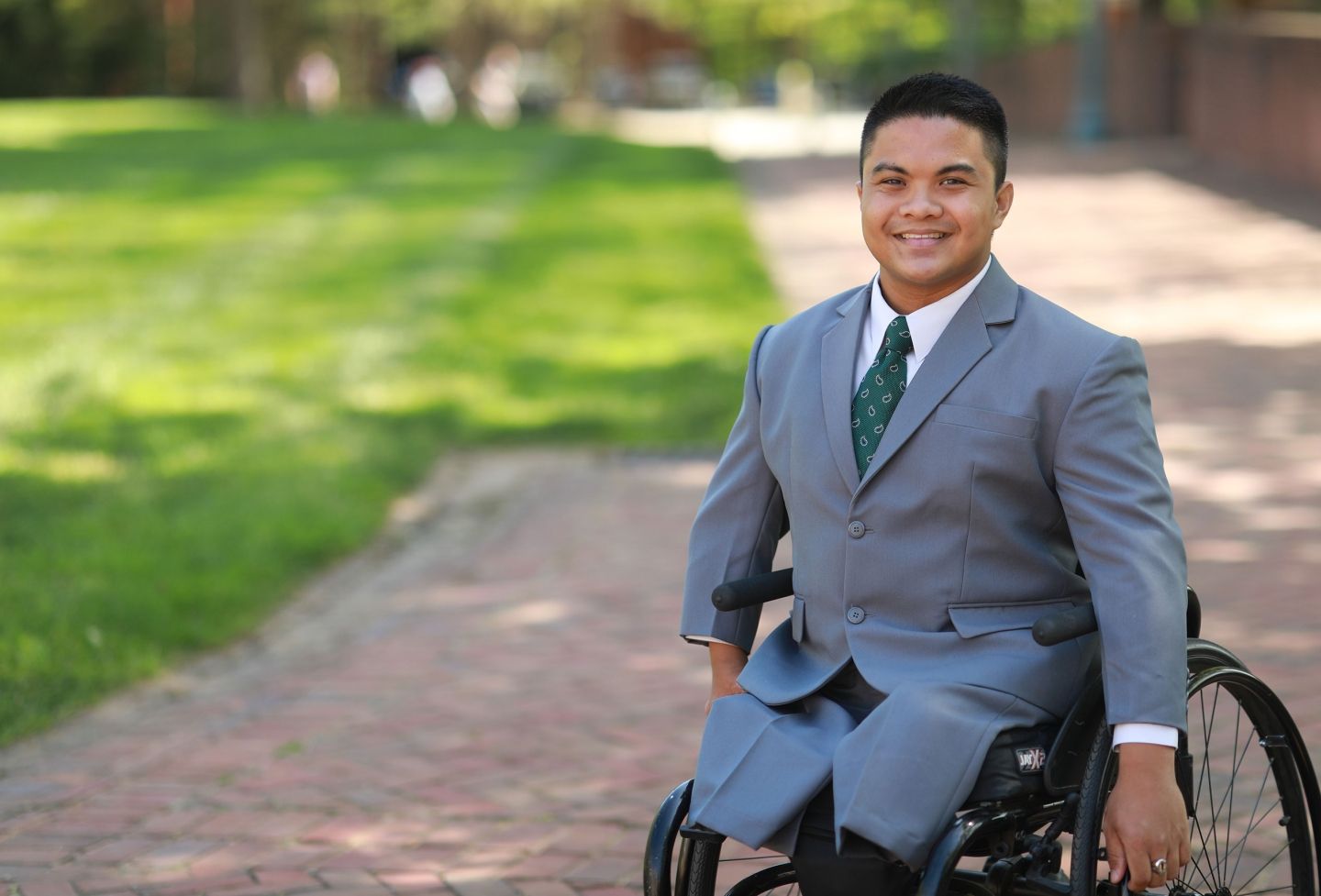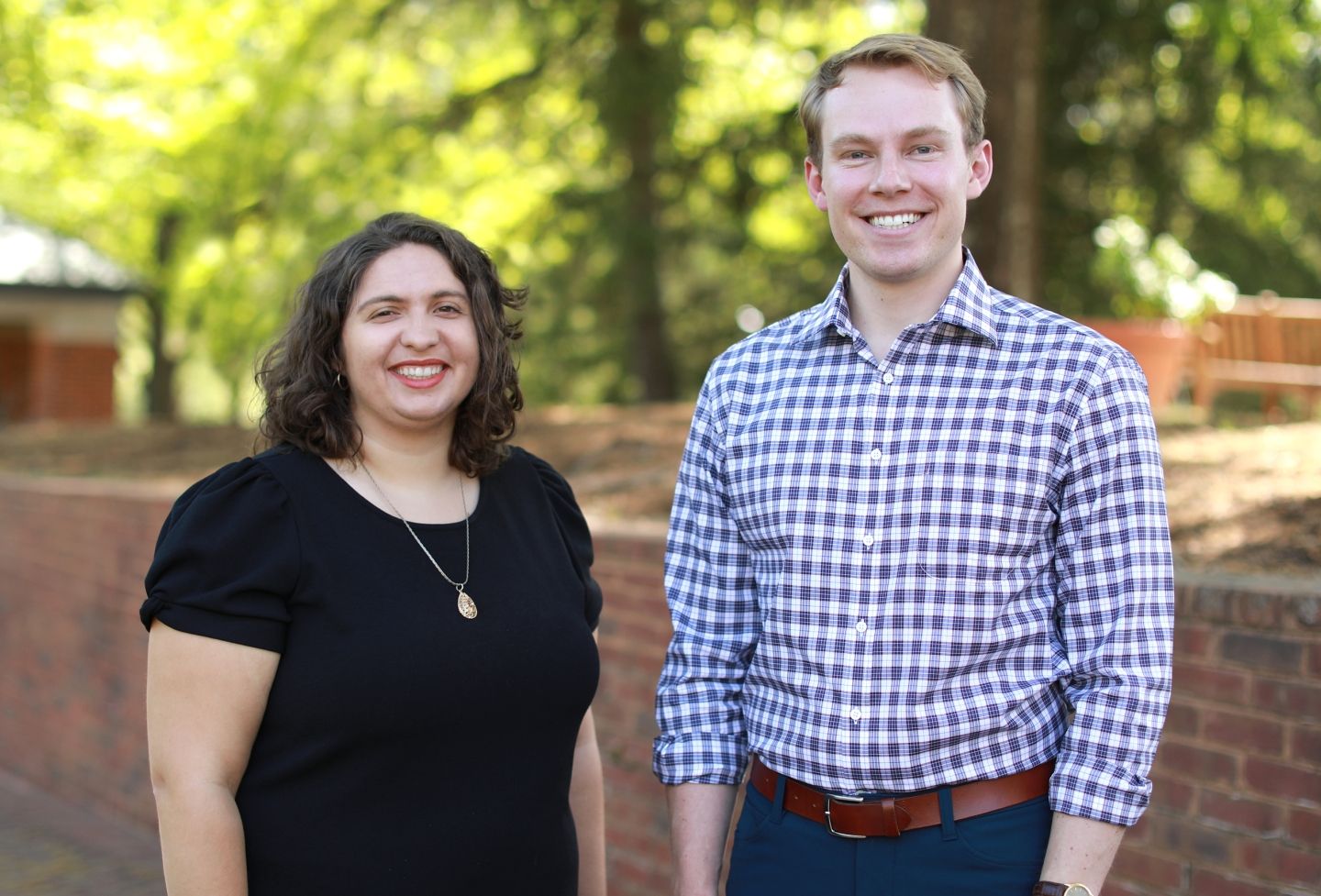Whether he’s socializing with neighbors abroad or leading a singalong in class during exam season, second-year student Andrew Searles at the University of Virginia School of Law has a knack for breaking the ice.
At UVA Law, Searles is an assistant articles editor for the Virginia Journal of International Law and director of coaching for the Extramural Moot Court Team, through which he also competes. Searles is a Law School ambassador for the Admissions Office and will serve as academic programming chair as a Peer Advisor for LL.M. students next year.
The Alpharetta, Georgia, native studied political science, political communication and Spanish at Louisiana State University.
In our occasional series “Star Witness,” Searles discussed learning Spanish and teaching bilingual classes in Spain, and how he switched majors as an undergraduate to prep for law school.
Tell us something about your life before law school.
In the two years after my undergraduate studies at LSU and before starting at UVA Law, I worked as an English teacher in Spain through the Spanish Ministry of Education’s North American Language and Cultural Assistants Program.
I taught my students, who were between 12 and 18, about American holiday traditions and the rules and terminology of baseball (followed, obviously, by an educational game of kickball). The school also offered a number of subjects half in English and half in Spanish. So, I prepared lessons on everything from deontological ethics to reduction-oxidation chemical reactions.
One of my favorite lessons involved the American criminal justice system. I had watched “12 Angry Men” at Cine Doré, a beautiful old movie theater in the heart of Madrid. Inspired by Henry Fonda’s stellar performance and my recent commitment to UVA, I decided to teach my students about my own imminent studies. After rewatching the movie and jotting down all the evidence and facts of the case, I wrote a script for a fake trial, which my students performed in class. Then, they broke into small groups to serve as juries. Once they had all reached a unanimous verdict, we watched the movie and debriefed the class’s thoughts on the case and the jury system.
Tell us more about your time in Spain.
Moving to a village in Spain was a huge adjustment. Nerja had a decent tourism industry, but few residents spoke English. I had minored in Spanish at LSU, but this was a whole different ballgame. The European Spanish accent, grammar and vocabulary were different from what I had learned in school, where almost all of my professors were from South America.
These initial challenges ultimately made that year one of the most rewarding of my life. I made plenty of progress along the way, like befriending the local tearoom owner where I would read in the afternoons and finally getting someone’s WhatsApp number. A group of co-workers invited me out for drinks and tapas one Friday afternoon. While I was getting more comfortable in one-on-one conversations, I only understood 20% of their large group conversation. I clung to my colleague in the English Department like an anchor, but I was determined to be a part of the conversation. Each week, we met for wine, Spanish tortilla, fried fish, eggplant in molasses, cheese, Spanish ham and garlic shrimp. And each week, I found myself understanding a bit more of what the group was saying.
By the end of the year, I had developed fulfilling friendships with people who didn’t speak any English. I was a full participant in our weekly tapas chats, and it didn’t tire me out as it once had. I stumbled upon a group of Spanish grandmas and ended up joining them for regular rosary prayers. What began as a daunting move had turned into an experience of community and confidence. I probably learned and grew more in that year than I ever had before (a feeling that, in retrospect, is not so dissimilar from being a 1L).
Why law school?
I think I had always been at least a bit interested in law, in the way that all political science majors whose parents told them they are “good at arguing” are. But I knew that law wasn’t for everyone.
My junior year at LSU, I saw that the law might be something that I could genuinely enjoy. I switched my second major from film to political communication. Starting a degree in a whole new college so late in the game, I had to do things a little out of order. This meant that I took an upper-level Media Law class at the same time as Intro to Media Writing. And I absolutely loved it. Learning about the tiers of scrutiny, hearing the stories behind landmark First Amendment cases, and researching the rationales behind various Supreme Court decisions was some of the most fascinating work I had ever done.
I felt that the law was a place where I could actually make a difference, at least for individual clients navigating complicated legal waters. I feel very fortunate to say that the people I’ve met and the things I’ve studied at UVA — and the work I’ve done this summer as an intern at the Shelby County Public Defender’s Office in Memphis, Tennessee — have fulfilled all the things I wanted out of the beginning of my legal career.
Describe your most interesting law school experience.
If I had to pick a single moment, it would have to be the last day of Civil Procedure in my 1L fall semester. It was the week before our first round of exams, and everyone was pretty nervous. We had worked so hard all semester, and everything was coming to an end so quickly.
Luckily, I was prepared to help lighten the mood. Every day that semester, Professor [Ann] Woolhandler would stop the class after about an hour for “a joke from Mr. Searles.” Before the last class, I asked her if I could use the projector for one last joke.
Instead of crafting a standard joke or legal pun, I wrote a song. Set to the tune of The Beatles’ “Let It Be,” my song focused on the Federal Rules of Civil Procedure — specifically, Rule 12(b).
When the final joke hour finally came, I passed out copies of the lyrics to everyone in the class and pulled up a karaoke version of “Let It Be” on the class projector. I wasn’t sure how receptive a bunch of highly professional lawyers-to-be would take to a class singalong, but the result was a thing of beauty. The whole class — from the front-row gunners to the strong-but-silent types in the back — lifted their voices as one in full-voiced song. People were laughing, with smiles on their faces and tears in their eyes. Professor Woolhandler even played the air guitar.
Amid all the captivating, intellectually rewarding moments of my first year of law school, the thing that most fulfilled me was getting to share those moments with people I am happy to call friends. We learn together. We work hard together. But we can be silly and laugh together.
What’s next for you?
Eventually, I would love to spend a year or two clerking. But there are so many things that interest me and that I want to learn more about — antitrust, land use law, First Amendment law, white-collar defense, criminal procedure, administrative law, academic research methodology — and the list goes on. Until then, I’m excited to get more hands-on experience at my summer job, where I’ve already gotten to work directly with clients and do some legal research to help get people home to their families.
Founded in 1819, the University of Virginia School of Law is the second-oldest continuously operating law school in the nation. Consistently ranked among the top law schools, Virginia is a world-renowned training ground for distinguished lawyers and public servants, instilling in them a commitment to leadership, integrity and community service.


